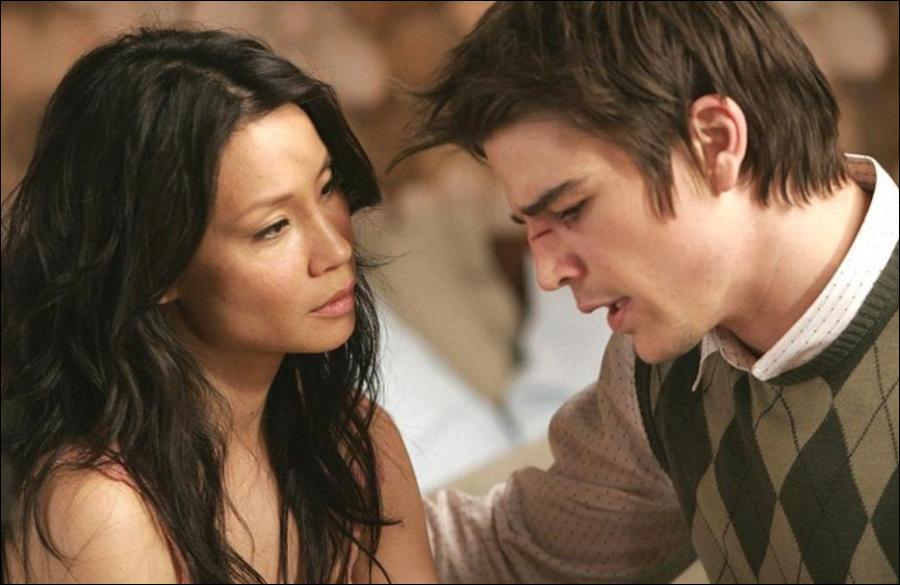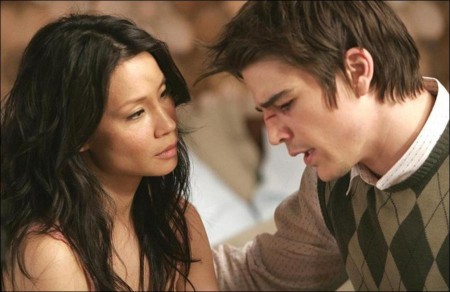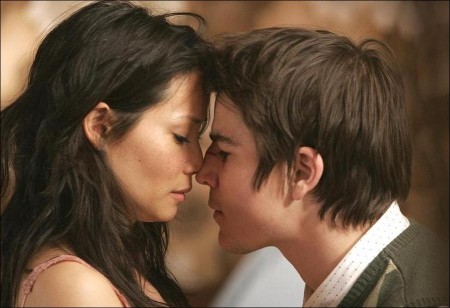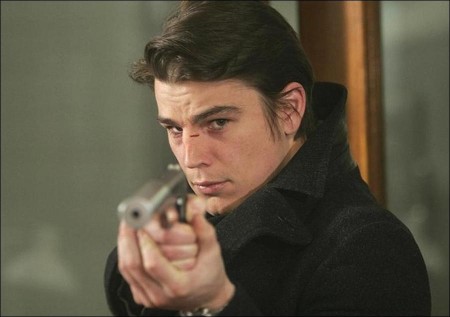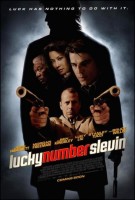Luck has nothing to do with.
Lucky Number Slevin” is a comic thriller that twists and turns its way through an underworld of crime and revenge where nothing is as it seems. Set in New York City, a case of mistaken identity lands Slevin (Josh Hartnett) into the middle of a war being plotted by two of the city’s most notorious rival crime bosses: The Rabbi (Ben Kingsley) and The Boss (Morgan Freeman). Slevin is under constant surveillance by relentless Detective Brikowski (Stanley Tucci) as well as the infamous assassin Goodkat (Bruce Willis) and finds himself having to hatch his own ingenious plot to escape the maze alive.
“Lucky Number Slevin” is set in the world of New York gangsters and follows a case of mistaken identity, which lands Hartnett’s character (Slevin) in the middle of a murder being plotted by one of the city’s most notorious crime bosses.
About the Production
Lucky Number Slevin began in screenwriter Jason Smilovic’s imagination in 1997 as a story “about a guy who was just incredibly unlucky,” as Smilovic puts it, and evolved over the years into a clever, dark, genre-bending thriller with surprising plot twists and irreverent characters.
Tyler Mitchell, one of the producers for Film Engine, charts the script’s history: “Robert Kravitz [one of Lucky Number Slevin’s producers] found the script and submitted it to our company.
“In the world of Jason Smilovic, everyone talks too much,” McGuigan jokes. “We never ad-libbed. None of the actors ad-libbed anything. The words were so particular to this film that if the voice were to change, it would change the film dramatically because of its heightened language.”
“In the world of Jason Smilovic, everyone talks too much,” McGuigan jokes. “We never ad-libbed. None of the actors ad-libbed anything. The words were so particular to this film that if the voice were to change, it would change the film dramatically because of its heightened language.”
McGuigan was eager to re-team with Josh Hartnett, with whom he’d formed a close working relationship during the filming of the romantic drama Wicker Park. Hartnett was drawn to the title character because the role was “an unassuming, goofy guy that everyone can all write off.” Mitchell describes Hartnett’s qualities for the role: “When we were casting the part, we really wanted an actor who’s a very charismatic, easy-going guy who you believe could fall down this rabbit hole into this gangster wonderland, and find himself pinging back and forth between these criminal enterprises, and yet transform at the end. I knew Josh had that darker side to him from a movie he did for our company called O.”
“It’s great that your lead character has a broken nose in the beginning of the film. You like him. He’s rather sweet with it,” McGuigan notes of the character. Many of Slevin’s endearing qualities come courtesy of the film’s leading man: “Before Josh was involved, Slevin was more of a smart-ass. He was much less likeable, actually. We rewroteit to fit Josh’s character.”
Similarly, when Lucy Liu signed on to play the role of Lindsey, the filmmakers were quick to imbue the role with aspects of the actress’ own personality. Chris Roberts of Ascendant says, “We actually rewrote the role for her, because she does have so muchenergy. She made Lindsay a faster talking, more precocious character.”
“I think that Lucy’s personable and cute and smart,” McGuigan says of Liu. “The character wasn’t fully worked out. We needed to find an actress we could base the character on, in part. Jason liked the idea of having a smart neighbor who was workingeverything out and helping the audience understand what was going on. She goes overthe plot over and over again. It’s a nice device. Because she’s smart, audiences believeher. I think it works well.”
“When she signed on, it just became so clear what the part needed,” Smilovic says. “Lucy has an amazing quirkiness to her, and I thought the character had to embody that. She really completes the Rosalind Russell-Cary Grant kind of dynamic between her and Slevin.”
Hartnett agrees that his sole female co-star brought something special to the mix. “Lucy’s a very sparkly girl. She’s a fireball, and she is a lot like Lindsey. I think she’s perfect for it.”
Liu had great fun portraying the vibrant, overly-involved neighbor. “Lindsey’s a coroner,” Liu comments, “so she has an analytical mind and she puts together stories of what she thinks happened. I think she’s very curious, and she doesn’t run from those things: They make her more interested. She’s not a dull girl. She likes to get into people’s past and their personal lives a little bit.”
Smilovic wrote the key role of The Rabbi specifically for Academy Award winner Sir Ben Kingsley. The writer, who was on set for Kingsley’s first day of filming, observes: “His talents surpass my wildest imagination. I was floored when I saw him bringing the character to life. That had the greatest sort of impact, because I remember writing it and thinking about him. That was the most nostalgic kind of event for me.”
“I thought it was very funny. It was very witty, and I thought it was the kind of film my sixteen-year-old son would love to watch, because he’s intrigued by the labyrinth of plots that you have to keep in your head, willingly and happily,” Kingsley says of Smilovic’s script. “When audiences are provoked by a script like this, they leave the cinema with their intelligence actually stimulated. This script has a wonderful rhythm. It expects the audience to be open to eccentricity and wild leaps of the imagination on behalf of the part of language.”
What drew Kingsley most to the role of The Rabbi was “how he mobilized his language. It isn’t the combination of gangster and rabbi, but it’s that combination of creative intelligence and the destructive act.”
Roberts admits that the filmmakers couldn’t believe how well their own luck was running when, eight weeks before the start of shooting, the last two cast members to sign on for two key roles were Bruce Willis and Morgan Freeman. “When we first got the script, we thought there were so many great roles, and so much great dialogue, that it was really going to gravitate towards actors, but this is really beyond imagination. When Morgan and Bruce signed on, it was totally unexpected. They rounded out an absolute dream cast.”
Academy Award winner Morgan Freeman portrays “The Boss,” Lucky Number Slevin’s sharp-tongued crime lord. “Playing a bad guy is always sort of fun,” Freeman says of his desire to play The Boss. “But look at the cast! It’s as much of a joy of working with colleagues who you have this appreciation for as anything else.”
Bruce Willis slipped into the role of Goodkat with an ease that impressed his costars. Hartnett describes the character: “Goodkat’s the guy they bring in when things get too ugly, and he’ll take it over from there. He doesn’t have any qualms about doing something most people would have a moral issue with, and that makes him frightening.
Bruce was just great, so easy to work with and he made the process fun.” Willis met Paul McGuigan when their creative paths almost crossed on another project. Though that collaboration never came to fruition, Willis remained eager to work with the director. McGuigan was surprised to learn that Willis would gladly take on a supporting role: “He called me in Montreal and asked why I hadn’t called him. We didn’t call him because we didn’t think he would do it!”
As Morgan Freeman puts it, “Bruce and I share the same joy of working, and it’s very evident. When he’s working, he’s able to kick on this instant super intensity and that’s what we like about him. He carries this edge of danger. You believe him when he kills people. You just believe that’s what he can do.”
One of the film’s most memorable scenes is an acting tour de force between Freeman and Kingsley: a long-awaited confrontation between The Rabbi and The Boss in which the two are tied together in a chair. Roberts says, “I get chills down my spine thinking about that scene. You’ve got two Oscar winning actors, two of the finest actors working today, sharing the screen for the first time in a nine minute long scene in which neither guy was going to blink. They absolutely gave one of the most tremendous scenes that I’ve seen committed to film in a long time. Jason specifically wrote it so they were tied back-to-back and could only act from the neck up.”
Smilovic explains the two characters’ complicated history: “These guys were best friends, they were partners who used to work together and they had a falling out over a power struggle, and the result was each man was sent to his respective tower of isolation to live until the other guy was gone, but twenty years later, they were both still shut-ins, essentially.”
“They’re both keeping each other hemmed up,” Freeman adds. “They’re both supremely paranoid about each other. As soon as one sets foot outside, the other’s snipers are waiting for him. That’s the game they’ve been playing all these years.”
McGuigan found that the confrontation between The Rabbi and The Boss required little direction: “These two men have been on the cinema screens for so long that people give them a certain weight. There’s a weight to these men. When you put them on the screen, their characters carry that same weight. Their characters have such gravitas. It was a pleasure.”
Filming the scene was mesmerizing for the cast and crew. “Everyone came in on their day off to watch the scene,” McGuigan recalls. “Bruce Willis came and sat beside me to watch two great actors. I didn’t do much. I sat there and watched it as well.”
These production notes provided by The Weinstein Company.
Lucky Number Slevin
Starring: Bruce Willis, Josh Hartnett, Lucy Liu, Morgan Freeman, Ben Kingsley
Directed by: Paul McGuigan
Screenplay by: Jason Smilovic
Release Date: April 7th, 2006
Running Time: 110 minutes
MPAA Rating: R for strong violent, sexuality and language.
Box Office: $21,600,000 (US total)
Studio: The Weinstein Company
Box Office Totals
Domestic: $22,495,466 (40.0%)
Foreign: $33,813,415 (60.0%)
Total: $56,308,881 (Worldwide)
